
The Temptation of St Anthony is a circa 1525 to 1530 oil on panel painting by a follower of Hieronymus Bosch, now in the Centraal Museum in Utrecht. [1] [2]

The Temptation of St Anthony is a circa 1525 to 1530 oil on panel painting by a follower of Hieronymus Bosch, now in the Centraal Museum in Utrecht. [1] [2]
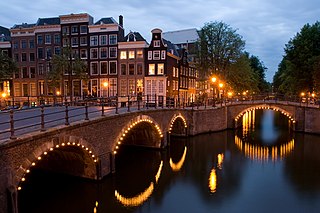
Amsterdam is the capital and most populous city of the Netherlands, with The Hague being the seat of government. It has a population of 921,402 within the city proper, 1,457,018 in the urban area and 2,480,394 in the metropolitan area. Located in the Dutch province of North Holland, Amsterdam is colloquially referred to as the "Venice of the North", for its large number of canals, now designated a UNESCO World Heritage Site.
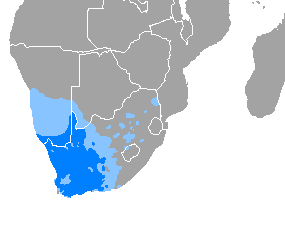
Afrikaans is a West Germanic language that evolved in the Dutch Cape Colony from the Dutch vernacular of Holland proper used by Dutch, French, and German settlers and people enslaved by them. Afrikaans gradually began to develop distinguishing characteristics during the course of the 18th century. Now spoken in South Africa, Namibia and Botswana, Zambia, and Zimbabwe, estimates c. 2010 of the total number of Afrikaans speakers range between 15 and 23 million. Most linguists consider Afrikaans to be a partly creole language.

Flanders is the Dutch-speaking northern portion of Belgium and one of the communities, regions and language areas of Belgium. However, there are several overlapping definitions, including ones related to culture, language, politics, and history, and sometimes involving neighbouring countries. The demonym associated with Flanders is Fleming, while the corresponding adjective is Flemish. The official capital of Flanders is the City of Brussels, although the Brussels-Capital Region that includes it has an independent regional government. The powers of the government of Flanders consist, among others, of economic affairs in the Flemish Region and the community aspects of Flanders life in Brussels, such as Flemish culture and education.
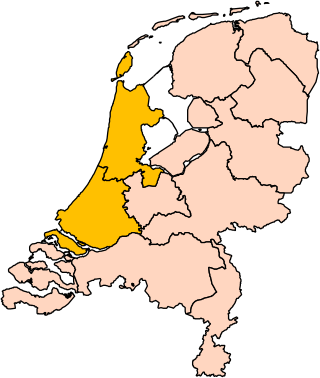
Holland is a geographical region and former province on the western coast of the Netherlands. From the 10th to the 16th century, Holland proper was a unified political region within the Holy Roman Empire as a county ruled by the counts of Holland. By the 17th century, the province of Holland had risen to become a maritime and economic power, dominating the other provinces of the newly independent Dutch Republic.

The Netherlands, informally Holland, is a country located in northwestern Europe with overseas territories in the Caribbean. It is the largest of four constituent countries of the Kingdom of the Netherlands. The Netherlands consists of twelve provinces; it borders Germany to the east, and Belgium to the south, with a North Sea coastline to the north and west. It shares maritime borders with the United Kingdom, Germany and Belgium in the North Sea. The country's official language is Dutch, with West Frisian as a secondary official language in the province of Friesland. Dutch, English and Papiamento are official in the Caribbean territories.

Suriname, officially the Republic of Suriname, is a country in northern South America. It is bordered by the Atlantic Ocean to the north, French Guiana to the east, Guyana to the west, and Brazil to the south. At just under 165,000 square kilometers, it is the smallest sovereign state in South America.

The Hague is a city and municipality of the Netherlands, situated on the west coast facing the North Sea. The Hague is the country's administrative centre and its seat of government, and while the official capital of the Netherlands is Amsterdam, The Hague has been described as the country's de facto capital. The Hague is also the capital of the province of South Holland, and the city hosts both the International Court of Justice and the International Criminal Court.

The United East India Company was a chartered company established on 20 March 1602 by the States General of the Netherlands amalgamating existing companies into the first joint-stock company in the world, granting it a 21-year monopoly to carry out trade activities in Asia. Shares in the company could be bought by any resident of the United Provinces and then subsequently bought and sold in open-air secondary markets. It is sometimes considered to have been the first multinational corporation. It was a powerful company, possessing quasi-governmental powers, including the ability to wage war, imprison and execute convicts, negotiate treaties, strike its own coins, and establish colonies.

William III, also widely known as William of Orange, was the sovereign Prince of Orange from birth, Stadtholder of Holland, Zeeland, Utrecht, Guelders, and Overijssel in the Dutch Republic from the 1670s, and King of England, Ireland, and Scotland from 1689 until his death in 1702. As King of Scotland, he is known as William II. He is sometimes informally known as "King Billy" in Ireland and Scotland. His victory at the Battle of the Boyne in 1690 is commemorated by Unionists, who display orange colours in his honour. He ruled Britain alongside his wife and cousin, Queen Mary II, and popular histories usually refer to their reign as that of "William and Mary".
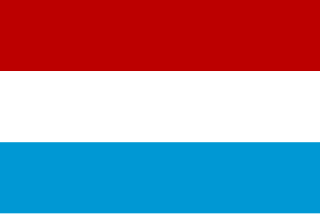
The United Provinces of the Netherlands, officially the Republic of the Seven United Netherlands, and commonly referred to in historiography as the Dutch Republic, was a confederation that existed from 1579 until the Batavian Revolution in 1795. It was a predecessor state of the present-day Netherlands. The republic was established after seven Dutch provinces in the Spanish Netherlands revolted against Spanish rule, forming a mutual alliance against Spain in 1579 and declaring their independence in 1581. It comprised Groningen, Frisia, Overijssel, Guelders, Utrecht, Holland and Zeeland.
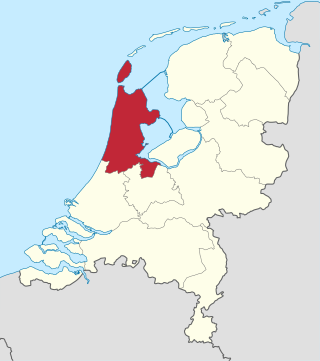
North Holland is a province of the Netherlands in the northwestern part of the country. It is located on the North Sea, north of South Holland and Utrecht, and west of Friesland and Flevoland. In November 2019, it had a population of 2,877,909 and a total area of 4,092 km2 (1,580 sq mi), of which 1,430 km2 (550 sq mi) is water.

Curaçao, officially the Country of Curaçao, is a Lesser Antilles island country in the southern Caribbean Sea and the Dutch Caribbean region, about 65 km (40 mi) north of the Venezuela coast. It is a constituent country of the Kingdom of the Netherlands. Together with Aruba and Bonaire, it forms the ABC islands. Collectively, Curaçao, Aruba, and other Dutch islands in the Caribbean are often called the Dutch Caribbean. It is the largest of the ABC islands in both area and population as well as the largest of the Dutch Caribbean.

The Dutch colonial empire comprised the overseas territories and trading posts controlled and administered by Dutch chartered companies—mainly the Dutch East India Company and the Dutch West India Company—and subsequently by the Dutch Republic (1581–1795), and by the modern Kingdom of the Netherlands after 1815. It was initially a trade-based system which derived most of its influence from merchant enterprise and from Dutch control of international maritime shipping routes through strategically placed outposts, rather than from expansive territorial ventures. The Dutch were among the earliest empire-builders of Europe, following Spain and Portugal and one of the wealthiest nations of that time.

Calyampudi Radhakrishna Rao,, commonly known as C. R. Rao, is an Indian-American mathematician and statistician. He is currently professor emeritus at Pennsylvania State University and Research Professor at the University at Buffalo. Rao has been honoured by numerous colloquia, honorary degrees, and festschrifts and was awarded the US National Medal of Science in 2002. The American Statistical Association has described him as "a living legend whose work has influenced not just statistics, but has had far reaching implications for fields as varied as economics, genetics, anthropology, geology, national planning, demography, biometry, and medicine." The Times of India listed Rao as one of the top 10 Indian scientists of all time. In 2023, Rao was awarded the International Prize in Statistics, an award often touted as the "statistics’ equivalent of the Nobel Prize". Rao is also a Senior Policy and Statistics advisor for the Indian Heart Association non-profit focused on raising South Asian cardiovascular disease awareness.

The Dutch are the people of the Netherlands. They share a common ancestry and culture and speak the Dutch language. Dutch people and their descendants are found in migrant communities worldwide, notably in Aruba, Suriname, Guyana, Curaçao, Argentina, Brazil, Canada, Australia, South Africa, New Zealand and the United States. The Low Countries were situated around the border of France and the Holy Roman Empire, forming a part of their respective peripheries and the various territories of which they consisted had become virtually autonomous by the 13th century. Under the Habsburgs, the Netherlands were organised into a single administrative unit, and in the 16th and 17th centuries the Northern Netherlands gained independence from Spain as the Dutch Republic. The high degree of urbanization characteristic of Dutch society was attained at a relatively early date. During the Republic the first series of large-scale Dutch migrations outside of Europe took place.
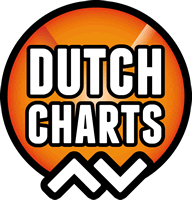
Dutch Charts, GfK Dutch Charts, MegaCharts is a chart company responsible for producing a number of official charts in the Netherlands, of which the Single Top 100 and the Album Top 100 are the most known ones. Dutch Charts are also part of GfK Benelux Marketing Services.

Dutch is a West Germanic language spoken by about 25 million people as a first language and 5 million as a second language. It is the third most widely spoken Germanic language, after its close relatives German and English. Afrikaans is a separate but somewhat mutually intelligible daughter language spoken, to some degree, by at least 16 million people, mainly in South Africa and Namibia, evolving from the Cape Dutch dialects of Southern Africa. The dialects used in Belgium and in Suriname, meanwhile, are all guided by the Dutch Language Union.

The Dutch East Indies, also known as the Netherlands East Indies, was a Dutch colony consisting of what is now Indonesia. It was formed from the nationalised trading posts of the Dutch East India Company, which came under the administration of the Dutch government in 1800.

Hendrik Johannes Cruijff was a Dutch professional football player and manager. One of the greatest players of all time, he won the Ballon d'Or three times, in 1971, 1973 and 1974. Cruyff was a proponent of the football philosophy known as Total Football explored by Rinus Michels, which Cruyff also employed as a manager. Because of the far reaching impact of his playing style and his coaching ideas, he is widely regarded as one of the most influential figures in modern football. For his achievements as a manager, he is also viewed as one of the greatest managers of all time.

Thomas Stanley Holland is an English actor. His accolades include a British Academy Film Award and three Saturn Awards. Some publications have called him one of the most popular actors of his generation.